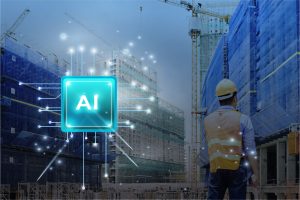Despite the rise of software and interactive technology in construction, McKinsey still believes that the industry is under-digitized. This follows the failure of construction firms to realize the potential benefits that artificial intelligence (AI) can bring to the site, most especially in business growth and operational efficiency.
Construction firms probably believe that there’s no place for AI on the site. The fact that this investment can be costly also makes a lot of firms – most especially the startups, small, and mid-sized companies, hesitant to use the technology.
Adopting the latest technology can also be daunting for crews who aren’t really tech-savvy. But AI in construction doesn’t need to be complex. In fact, construction project management software these days is already integrated with simple AI through its algorithm that measures the productivity rate of the members. So it’s good to know what it can do and how it can be used on-site before you totally eliminate them from your technology upgrade.
But first, what is Artificial Intelligence?
Artificial intelligence (AI) is a technology where a machine learns from the data it gathers and from this huge database of information, mimics human cognitive functions, like problem-solving, pattern recognition, and learning. In simpler terms, it studies human behavior and pattern and from these data, it tries to understand a situation to provide useful insights or conclusions.
So how can it be used in construction? Here’s how:
1.Generate more accurate data
Unlike the human brain or any logbook, artificial intelligence can store unlimited amounts of data and learn from it. This is made possible using its component called machine learning which uses the data it gathers, tests them in a trial and error method, and suggests improvements in your future construction projects.
Data gathered, also massive, are surprisingly more accurate as it measures them according to your instructions. Hence, the conclusions are more reliable than a person’s estimate.
AI can create comprehensive databases based on stock levels, schedules, and project-specific data which can help you waive any mistakes or issues encountered in previous projects on a new one.
In the planning stage, AI helps contractors to better assess timeframes to get more accurate insight when doing the schedule. This will help cut cost, and minimize waste since projects become more efficient.
2.Giving BIM more power
Gone were the days when project designs were created on paper. Today, the emergence of 3D modeling and building information modeling (BIM) transformed the process further. But with the addition of AI to these systems, models become walkable with complex details like plumbing, mechanical, and electrical can already be theorized. This helps the contractor come up with more accurate budgeting and the procedures are now more thorough. This helps prevent mistakes along the way.
3.Smart Construction
We’ve pointed out a lot of times that AI provides the opportunity for more accurate data gathering. It also brings out the full potential of BIM. Through these, contractors are able to come up with smarter decisions when it comes to planning. Procedures are also enhanced with AI analyzing the points where costly flaws might happen. Connecting it with construction project management software, it can also advance monitoring procedures. Several applications already use AI in these ways and their operations became more productive.4.Risk Mitigation
Risks can fall to actual accidents and they can be costly. There’s an AI used by big firms today to monitor possible risks on job sites so that the contractors can come up with more effective contingency plans. Leaders can also prioritize on mitigating high risks when AI determines one.
5.Prevent cost overruns
We’ve mentioned before that cost overruns can’t be prevented. But with AI, contractors can come up with better plans and more accurate budgeting so that extra expenses can be minimized.AI can also be used to predict cost overruns based on project size, contract type, and the competence level of project managers. It also goes through data of previous projects to help envision realistic timelines for present projects.Furthermore, AI helps crew members access training materials to help them enhance their skills and knowledge quickly. This reduces the time to prepare for a project and the new learning they acquire will help them improve their work quality. Consequently, project delivery is expedited.6.AI Will Address Labor Shortages
There’s an ongoing labor shortage in the construction industry. Robotics was employed on the site to cover the scarcity of manual work. Today, firms are also looking at using AI to cover for other positions like safety supervisor since it can cover risk monitoring and planning for risk mitigation.In 2017, McKinsey said construction firms can boost productivity by as much as 50 percent through real-time analysis of data. Firms then started to use AI for smarter distribution of labor and machinery across the site. When resources are used properly, efficiency and productivity are assured hence higher profitability is achieved.The Future of AI in Construction
Artificial Intelligence, Machine Learning, and Internet of Things (IoT) in construction can be a costly investment but its advanced features can result in a reduction of the project cost by up to 20 percent. This lifetime investment will then be worth it as you can save millions of dollars per project. Integrated into construction software like Pro Crew Schedule, robotics, and BIM, AI can transform the construction site into a fully-digitized workplace that generates higher profit. Finally, AI will be greatly leveraged for altering business models in the construction industry, reduce expensive errors, reduce worksite injuries, and make building operations more efficient. Hence, construction leaders should consider using AI in their firms.





